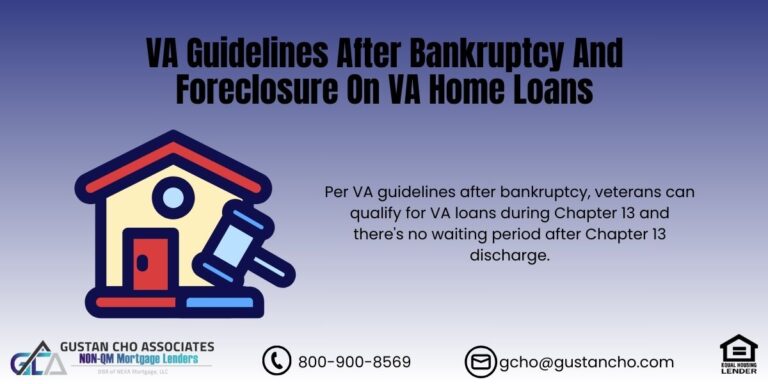HUD Chapter 13 Bankruptcy Guidelines on FHA Loans
In this article, we will cover HUD Chapter 13 Bankruptcy Guidelines on FHA loans, HUD, the parent of the Federal Housing Administration (FHA) is one of two mortgage loan programs that allow borrowers to qualify for home loans during Chapter 13 Bankruptcy repayment plan. You do not have to have the Chapter 13 Bankruptcy discharged to be eligible to qualify for an FHA loan during the Chapter 13 Bankruptcy repayment plan. You do need Bankruptcy Trustee Approval to get a mortgage during Chapter 13 Bankruptcy repayment plan.
VA loans are the other mortgage loan program that allows borrowers to qualify for a home loan during the Chapter 13 Bankruptcy repayment plan. VA and FHA guidelines during and after Chapter 13 Bankruptcy are exactly the same. In the following paragraphs, we will cover and discuss HUD Chapter 13 Bankruptcy guidelines on FHA loans.
How Long After Filing Chapter 13 Bankruptcy Can I Buy a House?
We will be covering HUD Chapter 13 bankruptcy guidelines for FHA loans during chapter 13 repayment plan. Once you file Chapter 13 Bankruptcy, a bankruptcy trustee is appointed to your case. The bankruptcy trustee will structure a repayment plan based on your gross annual salary over a specified term.
Most repayment terms are a five-year repayment plan. A portion of your check is set aside by the trustee to pay your creditors. Bankruptcy trustees will normally accept a mortgage during the Chapter 13 repayment plan as long as you are able to repay the new housing payment. FHA and VA are the two only mortgage loan programs that allow mortgage loans during Chapter 13 Bankruptcy repayment plans.
Chapter 13 Repayment Terms
Chapter 13 Repayment terms are normally three to five years long. If a person in a Chapter 13 Repayment plan is not allowed to qualify for a mortgage, the person cannot buy a house during this booming housing market and will be priced out of the housing market. FHA and VA loans allow people in a Chapter 13 Bankruptcy repayment plan to be able to qualify for a mortgage with Trustee approval without being discharged of their bankruptcy.
The excellent news is that buyers can qualify for FHA and VA loans during the Chapter 13 Bankruptcy repayment plan. Although it needs to be a manual underwrite, borrowers do not have to be priced out of the housing market since they are able to qualify for a mortgage during the Chapter 13 repayment plan.
Automated Underwriting System For Borrowers In Chapter 13 Bankruptcy Repayment Plan
The results of the automated underwriting system (AUS) during the Chapter 13 Bankruptcy repayment plan will render a refer/eligible and not approve/eligible per AUS. The automated underwriting system will not approve you (approving / eligible findings) during the repayment period in chapter 13. AUS will render refer/be eligible.
Therefore, it must be a manual underwriting. FHA and VA loans are the only real estate loan programs that allow manual underwriting. All mortgage companies do not offer manual underwriting on FHA and VA loans. However, the team at Non-QM Mortgage Lenders are experts in FHA and VA manual underwriting. A large percentage of our activities are manual underwriting.
Eligibility Guidelines on FHA Loans While in Chapter 13 Bankruptcy
House buyers can qualify for an FHA loan one year after filing for Chapter 13 Bankruptcy and making at least 12 timely payments to the bankruptcy trustee.
Need to be manual underwriting which means no late payments during the Chapter 13 Bankruptcy repayment period. To qualify for a 3.5% down payment FHA loan, you need to have at least a 580 credit score.
FHA Loans With 500 FICO Credit Scores
To qualify for a 3.5% down payment home purchase FHA loan, you need at least a 580 credit score. Borrowers with credit scores between 500 to 579 FICO, are eligible for an FHA loan but require a 10% down payment.
FHA loans while in Chapter 13 Bankruptcy repayment plan all manual underwrites. Manual underwriting guidelines require verification of rent, timely payments in the past 12 months, and restrictions on debt-to-income ratio requirements. High debt to income ratio can be acceptable with compensating factors.
Verification of Rent Guidelines on Manual Underwriting
Verification of rent is required on all manual underwriting borrowers. Verification of rent is only valid if the borrower can provide canceled checks to the landlord for the past 12 months. A cash receipt for rent payments is not a valid source to document rental verification. Rental verification is only valid with a 12-month canceled check or 12 months of bank statements.
Renters renting from a registered property management company are exempt from providing canceled checks or 12 months’ bank statements. The property management company can complete verification of rent letter provided by the lender to the property management company.
Exempt From Rental Verification on Manual Underwriting
There are instances where many renters cannot provide rental verification because they have been paying cash for their rent payments. This can derail qualifying for FHA loans during the Chapter 13 Bankruptcy repayment plan. However, Non-QM Mortgage Lenders can exempt rental verification for borrowers who are living rent-free with family members.
Non-QM Mortgage Lenders exempt rental verification for borrowers who have been living rent-free with family members to save money for their home purchase. A living rent-free letter provided by Non-QM Mortgage Lenders needs to be completed, signed, and dated, by the landlord of the borrower who was living rent-free.



